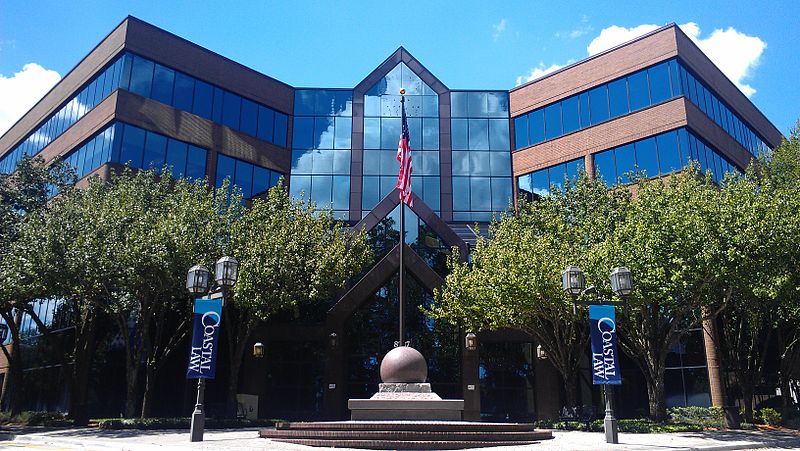Judge denies Florida Coastal's motion to reinstate federal aid

The Florida Coastal School of Law. Photo from Wikimedia Commons.
A federal judge has denied the Florida Coastal School of Law's motion for preliminary injunctive relief against the U.S. Department of Education seeking to reinstate student federal aid.
The school appeared to be out of compliance in February with eight ABA accreditation standards, and its parent company, InfiLaw, may be liable for $167 million in potential student loan discharges, according to an Aug. 9 order.
The DOE denied the for-profit law school’s federal aid reinstatement application in May, and Florida Coastal filed a lawsuit against the agency in July. The complaint alleges that the DOE acted arbitrarily and capriciously, without due process, when it terminated the for-profit school’s participation in the loan program.
“The court recognizes that the denial of injunctive relief here may well end [Florida Coastal School of Law’s] battle to continue to provide legal education in the Jacksonville community,” wrote Judge Marcia Morales Howard of the Middle District of Florida, wrote in her Aug. 9 order.
The law school is operating under a teach-out plan, approved by the ABA in June. No classes will be offered after the summer session, and current students will finish courses at other ABA-approved schools.
According to the Aug. 9 order, in February the council of the ABA’s Section of Legal Education and Admission to the bar determined Florida Coastal was out of compliance with eight accreditation standards. That finding is not posted on the section’s website, because the council isn’t finished with its review. The law school did not disclose the standards issue to the department, according to the order.
The accreditation findings were disclosed in a proposed asset agreement between Florida Coastal and Campbellsville University. Campbellsville University is a Kentucky private school associated with the Baptist church, and it was in discussions to acquire Florida Coastal’s assets for $1, according to the order.
The law school argued that it was not under any obligation to disclose the ABA findings to the department, according to the order.
It also details Florida’s Coastal’s attempts to have federal loans reinstated without Sterling Capital, a private equity firm that owns InfiLaw, entering into the required program participation agreement. Instead, Florida Coastal submitted letters of credit, which identified InfiLaw’s other, now-closed law schools—the Charlotte School of Law and the Arizona Summit Law School.
“This is significant because InfiLaw currently owes substantial liabilities to the Department stemming from the closure of [Charlotte School of Law] and [Arizona Summit Law School],” Howard wrote.
From those closed campuses, InfiLaw owes the DOE more than $5 million in student loan discharges, according to the order, and it faces potential liability for an additional $167 million coming from pending discharge applications.
In a statement, Florida Coastal wrote that it is disappointed with the order, and it’s been in discussions with multiple parties to acquire the school.
“These opportunities are substantially jeopardized by the court’s refusal to restore [Florida] Coastal’s access to student assistance funds. While consummation of these transactions would have likely resolved the department’s concerns about the school’s financial condition, the court did not meaningfully consider these options,” according to the statement.
For InfiLaw’s other schools, the Arizona Summit Law School entered into a teach-out plan in 2018, and the Charlotte School of Law shut down in 2017. The three schools filed separate due process actions against the ABA in May 2018 regarding accreditation, and the claims settled in 2019.
Updated Aug. 11 at 2:02 p.m. to include the statement from the Florida Coastal School of Law.



